Protecting Patient Data: Choosing the Right Email Hosting
HIPAA compliant email hosting is crucial for protecting patient health information (PHI). This listicle simplifies your search for the best solution in 2025. We'll explore seven top providers—Paubox, Hushmail, Virtru, ProtonMail, Mailhippo (formerly LuxSci), HIPAA Vault, and Microsoft 365 with HIPAA Configuration—comparing features, pricing, and security measures. These tools solve the problem of securely transmitting PHI and maintaining compliance, giving you peace of mind. Find the ideal HIPAA compliant email hosting option for your needs below.
1. Paubox
Paubox leads the pack in HIPAA compliant email hosting by focusing on seamless, secure communication. Their primary selling point is their zero-step encryption, meaning recipients don't need to create accounts, log into portals, or jump through any hoops to access encrypted emails. This eliminates the friction often associated with secure email and drastically improves the user experience for both senders and recipients. Paubox integrates directly with popular email platforms like Google Workspace and Microsoft 365, allowing you to send secure messages directly from your existing email client. This simplifies workflows and reduces the need for staff training on new software. This approach makes Paubox a strong contender for organizations prioritizing user-friendliness and efficiency in their HIPAA compliant email solution.
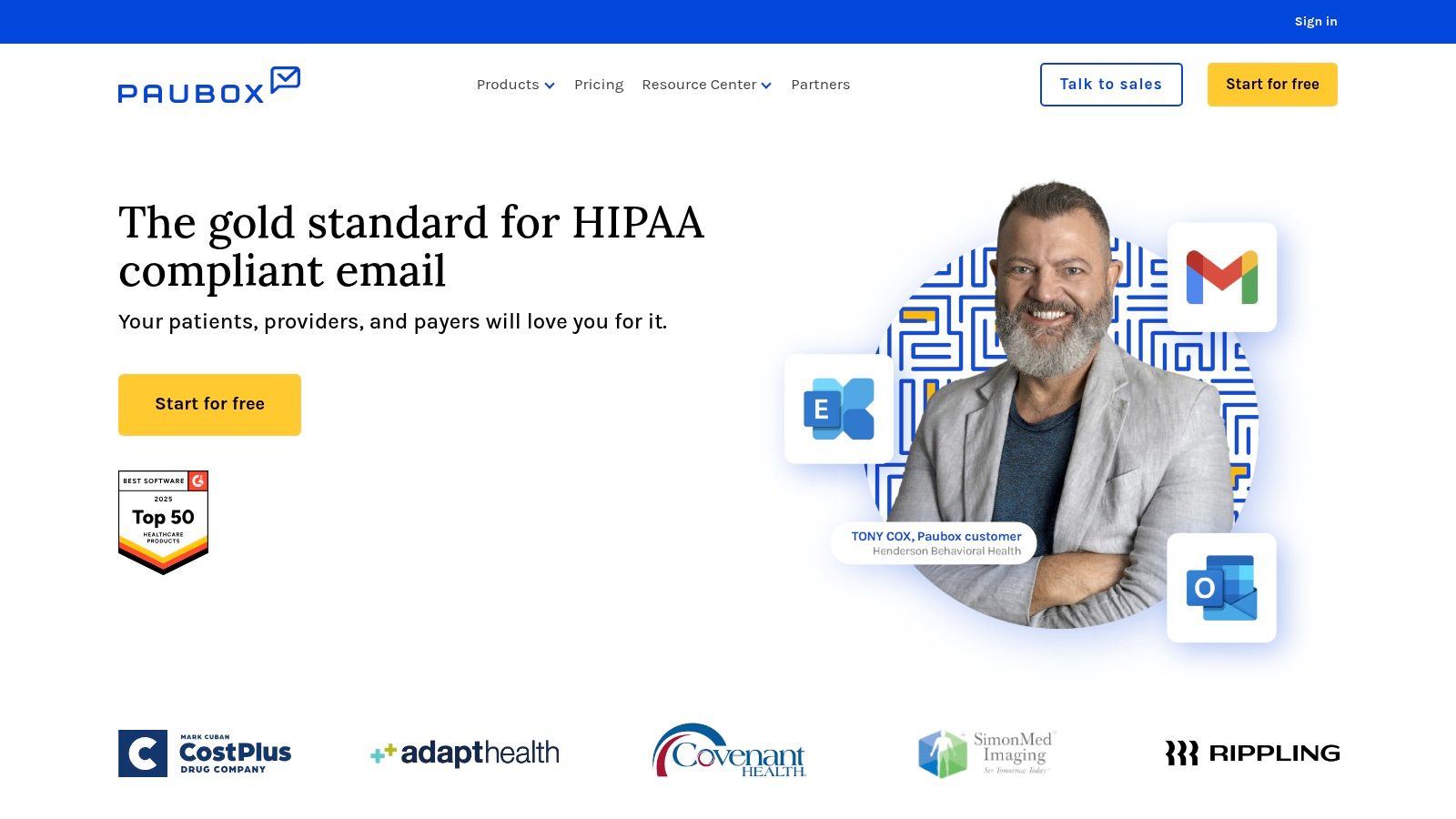
This ease of use doesn't come at the cost of security. Paubox leverages robust encryption protocols, including TLS 1.3, 256-bit AES encryption, and boasts HITRUST CSF certification. This ensures that Protected Health Information (PHI) remains confidential and secure in transit. Furthermore, built-in features like Email Data Loss Prevention (DLP) and inbound security with protection against phishing and malware add extra layers of defense. These security measures are crucial for maintaining HIPAA compliance and protecting patient data.
For IT administrators and security professionals, Paubox offers detailed activity logs for compliance monitoring and auditing. This allows organizations to track email activity and demonstrate compliance with HIPAA regulations. The inclusion of a Business Associate Agreement (BAA) further solidifies Paubox's commitment to HIPAA compliance and provides legal assurance for healthcare organizations.
Pros:
- Extremely user-friendly: Zero-step encryption eliminates the need for recipient portals or passwords.
- Seamless integration: Works with existing email platforms like Google Workspace and Microsoft 365.
- Advanced security features: Includes DLP, inbound protection, TLS 1.3, and 256-bit AES encryption.
- Compliance focused: Provides detailed activity logs, BAA, and HITRUST CSF certification.
Cons:
- Higher pricing: Can be more expensive than some competitors.
- Limited customization: Some deployments may find customization options restricted.
- Tiered features: Some advanced features require higher-tier subscription plans.
Website: https://www.paubox.com/
Paubox deserves its place on this list because it strikes a balance between robust security and unparalleled ease of use. While the pricing may be higher than some alternatives, the streamlined experience and advanced security features make it a worthwhile investment for organizations prioritizing HIPAA compliant email hosting without compromising user experience. Implementation is generally straightforward thanks to the integrations with existing email providers. Be sure to check their website for the latest pricing and plan details to determine which tier best suits your organization's specific needs and budget.
2. Hushmail
Hushmail stands out as a robust HIPAA compliant email hosting solution specifically tailored for the healthcare industry. It offers a comprehensive suite of tools designed to simplify secure communication for medical practices, mental health professionals, and other healthcare providers. For over 20 years, Hushmail has focused on providing encrypted email, secure web forms, and e-signatures, all within a single HIPAA-compliant package. This makes it an excellent choice for practices looking for an all-in-one solution that streamlines workflows and enhances patient privacy.
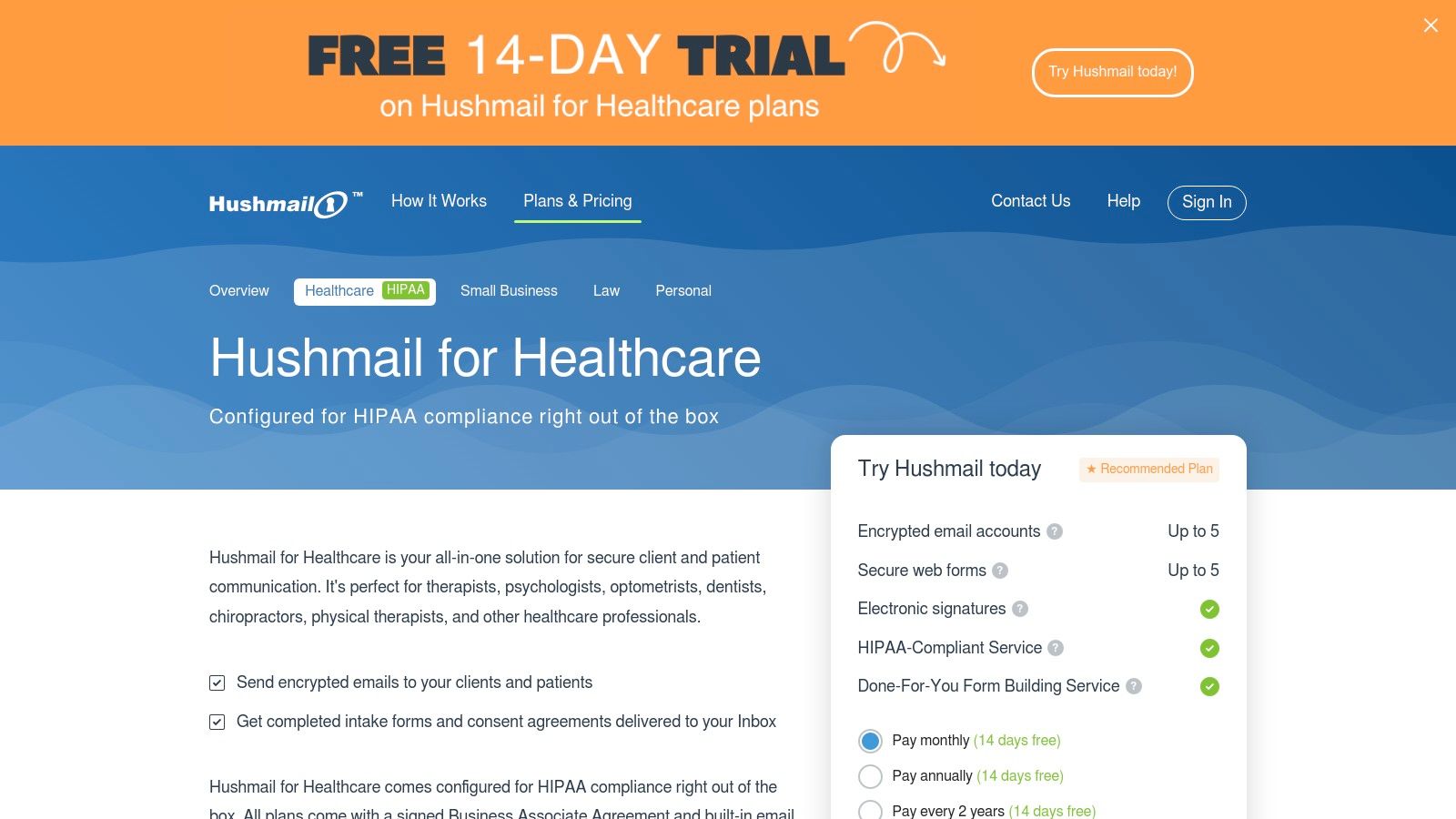
A key feature of Hushmail is its two-way encryption, ensuring that emails are protected both in transit and at rest. This is crucial for maintaining the confidentiality of Protected Health Information (PHI). Beyond email, Hushmail provides customizable secure web forms, ideal for collecting patient intake information and other sensitive data in a compliant manner. The integrated e-signature capability further streamlines administrative processes by enabling secure document signing directly within the platform. Hushmail's inclusion of a Business Associate Agreement (BAA) reinforces its commitment to HIPAA compliance, providing healthcare organizations with the necessary legal assurances.
Hushmail offers specialized plans designed to meet the specific needs of different healthcare sectors. This tailored approach ensures that practices of all sizes can find a plan that fits their budget and requirements. The platform's simple and intuitive interface makes it easy for staff to adopt and integrate into existing workflows. Furthermore, the availability of domain customization allows healthcare organizations to maintain a professional brand identity within their secure communications. Mobile apps for iOS and Android devices ensure that secure access to email and other features is available on the go.
While Hushmail provides a comprehensive solution, there are a few considerations. In some cases, recipients who are not Hushmail users may need to access a secure portal to view encrypted messages. While secure, this can introduce a slight friction in communication. Compared to mainstream email providers, Hushmail offers more limited storage options. This is something to keep in mind for practices that deal with large volumes of email and attachments. Lastly, while integrations exist, they are not as robust as those offered by some competitors.
Pros:
- All-in-one solution encompassing email, forms, and e-signatures.
- User-friendly interface facilitating easy adoption.
- Customizable domains for professional branding.
- Specialized plans catering to different healthcare sectors.
- Mobile apps for iOS and Android devices.
Cons:
- Recipients may require portal access in some instances.
- Limited storage compared to mainstream providers.
- Fewer integration options than some competitors.
Website: https://www.hushmail.com/healthcare/
Hushmail earns its place on this list due to its dedicated focus on HIPAA compliance and the comprehensive suite of tools it offers specifically for healthcare providers. The combination of encrypted email, secure web forms, and e-signatures within a single platform simplifies secure communication and streamlines workflows, making it a valuable asset for any healthcare organization prioritizing patient privacy and data security. While pricing details aren't readily available on the website, contacting Hushmail directly will provide specific pricing information tailored to your needs. Setup is generally straightforward, involving account creation, domain configuration (if applicable), and user onboarding.
3. Virtru
Virtru offers a unique approach to HIPAA compliant email hosting by focusing on encryption rather than providing a separate email platform. This makes it a strong contender for organizations already invested in platforms like Gmail or Microsoft Outlook. Instead of migrating to a new email system, healthcare providers can leverage Virtru's end-to-end encryption solutions to secure their existing email infrastructure and ensure HIPAA compliance. This data-centric security approach means that the protection travels with the email and attachments, regardless of where they are forwarded or stored. This is crucial for maintaining control and compliance in today's complex communication landscape.
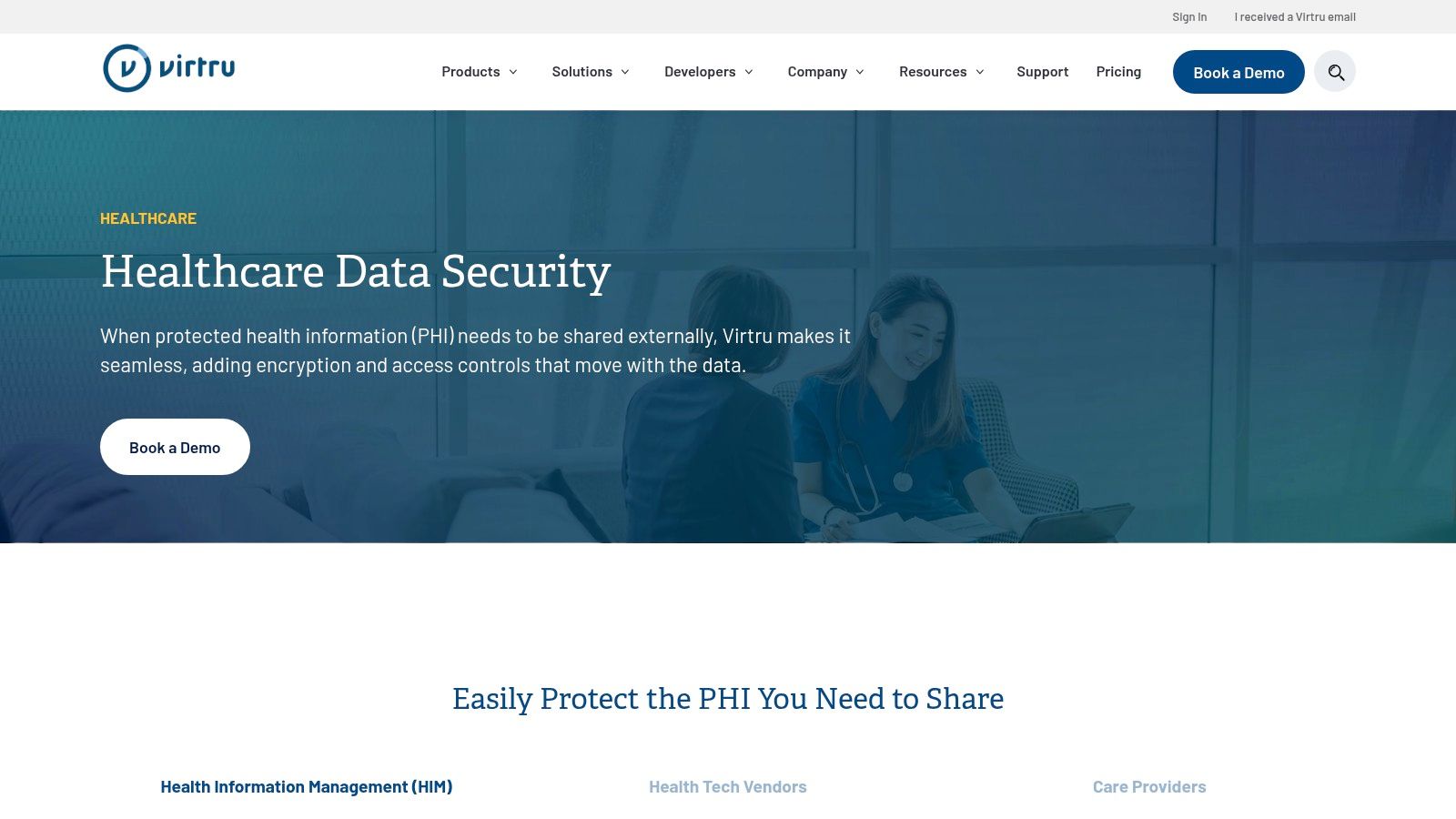
Virtru's standout features include granular access controls, allowing administrators to dictate who can view, forward, copy, or download email content. The ability to revoke access even after an email has been sent provides an extra layer of security and control, addressing concerns about accidental disclosures or unauthorized access. Automated data loss prevention (DLP) rules, specifically tailored for healthcare, further enhance compliance by preventing the transmission of sensitive patient information outside authorized channels. Audit trails meticulously track email activity, simplifying compliance monitoring and reporting.
For practical applications, consider a scenario where a physician needs to share a patient's medical records with a specialist. Using Virtru, the physician can easily encrypt the email containing the records directly within their existing Outlook interface. The specialist, upon receiving the email, will be prompted to verify their identity before accessing the protected information. This ensures only authorized individuals can view the sensitive data, maintaining patient privacy and adhering to HIPAA regulations.
Pros:
- Seamless integration: Works directly within Gmail and Microsoft Outlook, minimizing disruption to existing workflows.
- Revocable access: Provides the ability to revoke access to sent emails, even after they've been delivered.
- Granular control: Offers detailed control over forwarding, copying, and downloading of email content.
- Strong encryption: Employs robust encryption key management for enhanced security.
Cons:
- Recipient verification: Recipients may need to verify their identity, which can occasionally interrupt workflow.
- Complex configuration: Setting up advanced features can be complex and may require technical expertise.
- Pricing: Enterprise-level pricing may be prohibitive for smaller organizations.
While pricing information isn't publicly available, Virtru offers tailored solutions for businesses of all sizes. It's recommended to contact their sales team for a personalized quote. Technical requirements are minimal, primarily involving installing the Virtru plugin or extension for your chosen email platform.
Compared to setting up and maintaining a completely separate HIPAA compliant email hosting platform, Virtru offers a streamlined approach. For organizations already using Gmail or Microsoft Outlook, Virtru minimizes the disruption associated with email migration and allows IT teams to focus on other security priorities.
Implementation is straightforward. Typically, it involves installing a browser extension or add-in for the respective email client. Administrators then configure the desired security policies, such as access controls and DLP rules. User training is generally minimal due to the intuitive integration with familiar email interfaces. Virtru's website (https://www.virtru.com/healthcare/) provides detailed information and resources to assist with implementation and ongoing support. For those seeking robust HIPAA compliant email security without the complexity of migrating to a new email platform, Virtru is a compelling solution.
4. ProtonMail
ProtonMail stands out as a robust HIPAA compliant email hosting option, particularly appealing to privacy-conscious organizations and individuals in healthcare. Developed by CERN scientists, ProtonMail prioritizes end-to-end encryption and zero-access architecture. This means that only you and your intended recipient can decipher the content of your emails – not even ProtonMail itself has access. This is crucial for maintaining the confidentiality of Protected Health Information (PHI) as required by HIPAA. While not exclusively designed for healthcare, ProtonMail offers tailored plans that meet HIPAA compliance requirements, offering a solid solution for secure communication.
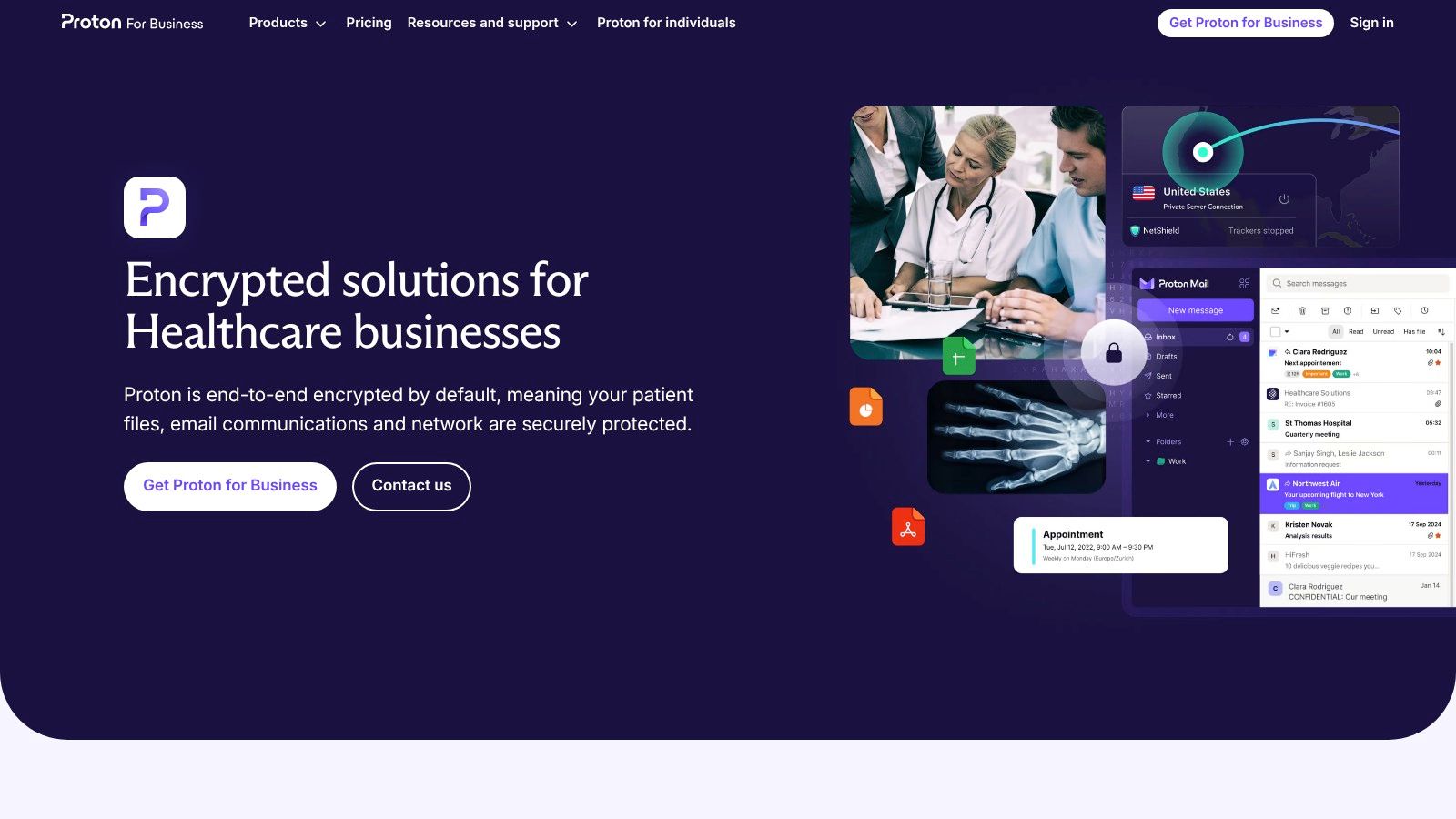
One key advantage of ProtonMail is its Swiss jurisdiction, known for its stringent privacy laws. This adds an extra layer of protection against data breaches and government surveillance. For communicating with individuals outside the ProtonMail ecosystem, password-protected emails can be sent, ensuring secure delivery even to recipients using standard email providers. Furthermore, ProtonMail allows you to set message expiration times for increased security and control over sensitive information. Custom domains are available for business accounts, allowing for professional branding and seamless integration into existing workflows.
ProtonMail offers a variety of plans, including a free basic account with limited storage and features. Paid plans provide increased storage, custom domains, and priority support. Business plans specifically designed for HIPAA compliance are available, offering a Business Associate Agreement (BAA) – a crucial component for HIPAA compliance. While pricing information is available on their website, contacting their sales team is recommended for specific healthcare plan details and to discuss your organization's needs.
Features:
- End-to-end encryption and zero-access encryption
- Password-protected emails for non-ProtonMail users
- Swiss privacy laws and data protection
- Message expiration timing options
- Custom domains available for business accounts
Pros:
- Strong encryption and security foundation
- Privacy-focused approach with no tracking or logging
- Offers free basic accounts with paid upgrades
- User-friendly mobile and desktop apps
Cons:
- Recipients without ProtonMail must use a portal system to access encrypted messages. This can sometimes be perceived as less convenient than seamless integration with other email platforms.
- Limited integration with other healthcare systems compared to more specialized HIPAA compliant email providers.
- Business features, while robust, are less tailored to the specific needs of healthcare organizations than some competitors.
- Limited storage on lower-tier plans, which might require upgrading for users dealing with large amounts of data.
Implementation Tips:
- For HIPAA compliance, ensure you opt for a business plan that includes a BAA.
- Train staff on how to use ProtonMail effectively, including sending password-protected emails to external recipients.
- Evaluate your storage needs and choose a plan accordingly.
- Explore ProtonMail's bridge application, which allows integrating ProtonMail with desktop email clients like Thunderbird and Outlook for a more familiar user experience.
ProtonMail earns its spot on this list due to its strong commitment to privacy and security. Its robust encryption, coupled with its user-friendly interface, makes it a viable option for individuals and smaller healthcare practices seeking HIPAA compliant email hosting. However, larger organizations with complex integration needs and extensive storage requirements may find more specialized solutions more suitable. For more information and to explore their plans, visit ProtonMail's healthcare page.
5. Mailhippo (formerly LuxSci)
Mailhippo (formerly LuxSci) stands out as a robust HIPAA compliant email hosting solution specifically designed for healthcare organizations and other businesses handling sensitive data. It offers a comprehensive suite of security features that go beyond basic compliance, allowing you to tailor your email environment to your specific needs. This makes it a strong contender for organizations prioritizing security and control. It prioritizes secure communication through multiple layers of encryption and advanced security measures, ensuring that protected health information (PHI) remains confidential and adheres to HIPAA guidelines. Whether you're a small clinic or a large hospital system, Mailhippo aims to provide the tools you need to secure your email communications.
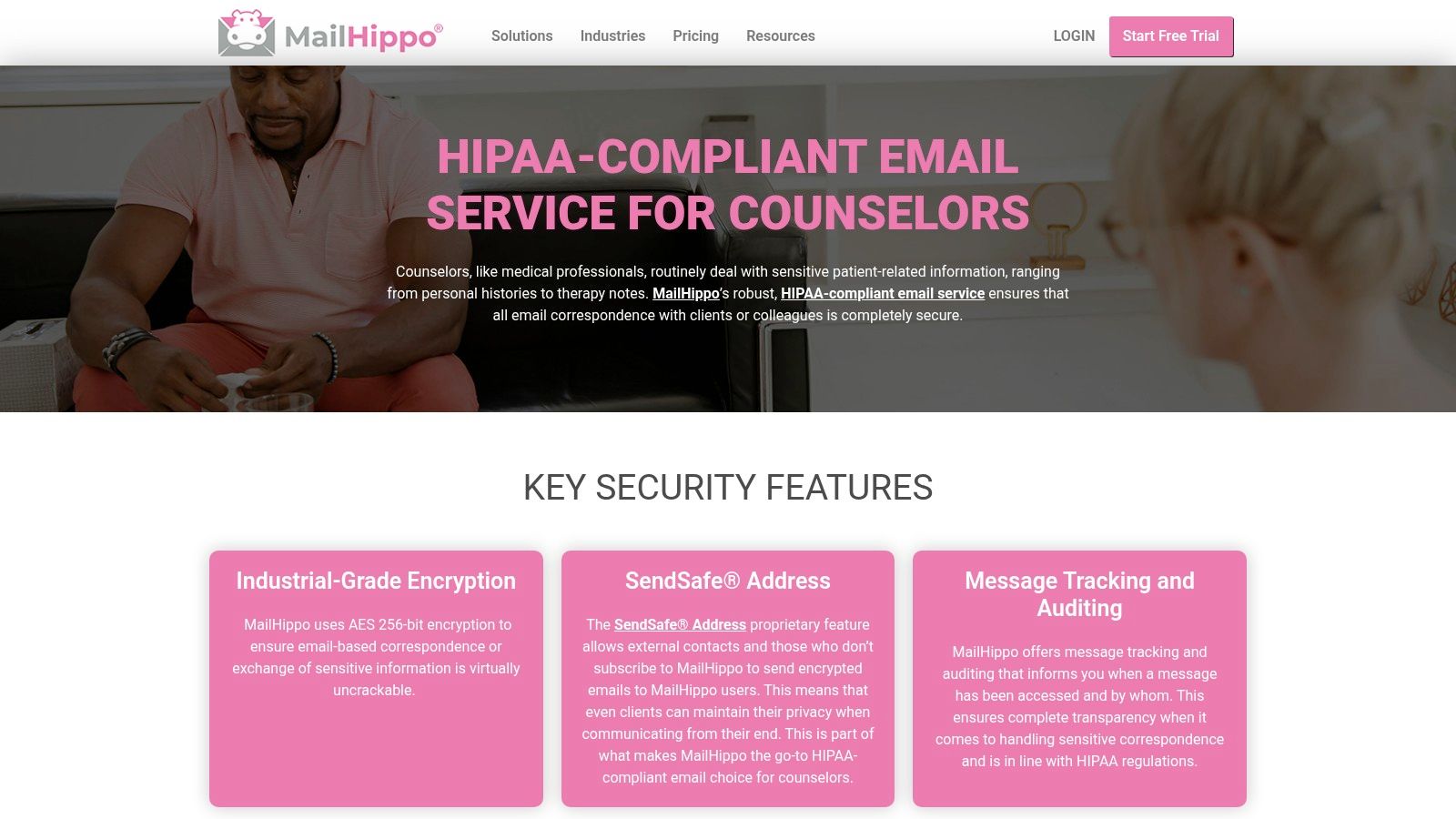
Mailhippo's commitment to HIPAA compliance is evident in its feature set. It offers not only standard TLS encryption but also forced TLS, ensuring a secure connection whenever possible. For recipients who lack TLS capabilities, Mailhippo provides a secure message pickup system, maintaining confidentiality even in less secure environments. This flexibility makes it a suitable choice for organizations that communicate with a variety of external partners.
Beyond encryption, Mailhippo offers advanced email filtering and phishing protection, mitigating the risk of malware and social engineering attacks, crucial for maintaining HIPAA compliance. Archiving and backup options ensure data retention and disaster recovery, further strengthening your security posture. The platform also allows for custom branding and white-labeling, giving your organization a professional and consistent image.
Features:
- Multiple encryption options (TLS, PGP, S/MIME, Secure Portal)
- Secure message pickup system for non-secure recipients
- Email archiving and backup options
- Advanced email filtering and phishing protection
- Custom branding and white-labeling options
- Advanced administration tools and user management
Pros:
- Highly customizable security settings allow granular control.
- Robust compliance features and detailed logging facilitate audits.
- Flexible enough to adapt to various organization sizes, from small clinics to large hospitals.
- Advanced administration tools streamline user management and control.
Cons:
- The interface can be less intuitive than some competitors, potentially requiring more training.
- The setup process can be complex due to the numerous customizable options.
- There can be a higher learning curve for non-technical users.
Pricing: Mailhippo offers tiered pricing plans based on storage, user count, and features. Contact their sales team for specific pricing details.
Technical Requirements: Mailhippo's technical requirements vary depending on the chosen setup and features. Consult their documentation or support team for detailed information.
Implementation/Setup Tips:
- Plan your implementation carefully: Due to the numerous customization options, take time to assess your organization's specific needs and configure Mailhippo accordingly.
- Utilize their support resources: Mailhippo offers comprehensive documentation and support to assist with setup and ongoing management.
- Train your staff: Ensure your team is adequately trained on using Mailhippo's features, especially the security and encryption tools.
Comparison: Compared to simpler email hosting providers, Mailhippo offers significantly more robust security and compliance features. While solutions like Google Workspace or Microsoft 365 offer basic HIPAA compliance options, Mailhippo goes further with features like forced TLS and secure message pickup, giving you more control over your security posture.
Why Mailhippo deserves its place on this list: Mailhippo earns its spot due to its dedicated focus on HIPAA compliance, comprehensive security features, and flexibility. Its multiple encryption options, robust administration tools, and detailed logging make it a suitable choice for organizations handling sensitive data and prioritizing strong security. While the interface and setup may pose a slight challenge initially, the level of control and security offered makes it a worthwhile investment for organizations needing robust HIPAA compliant email hosting. Visit Mailhippo
6. HIPAA Vault
HIPAA Vault offers a robust HIPAA compliant email hosting solution specifically designed for healthcare organizations, business associates, and other entities bound by HIPAA regulations. This service prioritizes the security and privacy of Protected Health Information (PHI) while striving for user-friendliness. If your organization needs to ensure email communication adheres to strict compliance standards, HIPAA Vault offers a dedicated platform to meet those needs. Their fully managed service takes the burden off your IT team, letting them focus on other critical tasks.
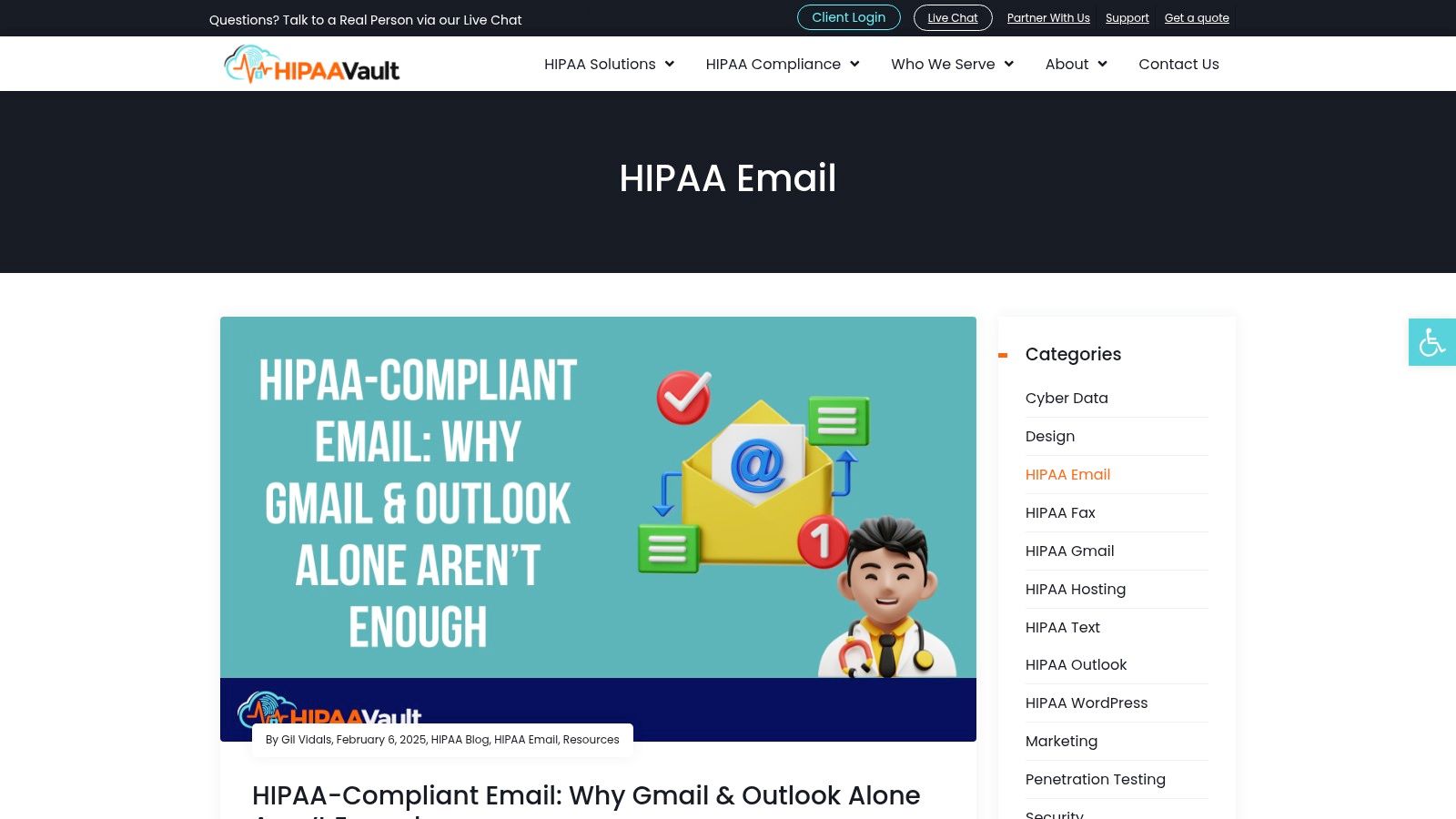
HIPAA Vault earns its spot on this list due to its exclusive focus on healthcare compliance. Unlike generic email hosting providers that offer HIPAA compliant add-ons, HIPAA Vault builds compliance into the core of its service. This dedicated approach ensures that all features, from encryption to archiving, are designed with HIPAA regulations in mind. This makes it a strong contender for organizations dealing with sensitive patient data.
Key features include 256-bit AES encryption for all emails, ensuring data confidentiality both in transit and at rest. A secure webmail portal provides convenient access to your inbox, while integrated spam and virus filtering protect against malicious threats. Compliance monitoring and real-time alerts keep you informed of any potential issues, and automatic email archiving and backup guarantee data retention and recoverability. These features are crucial for maintaining a secure and compliant email environment.
Pros:
- Specialized focus on healthcare compliance: HIPAA Vault's expertise in HIPAA regulations ensures that all features and processes are aligned with the necessary standards.
- 24/7 technical support with compliance expertise: Access to expert support around the clock can be invaluable in addressing compliance-related concerns quickly and efficiently.
- Comprehensive security monitoring: Proactive monitoring helps identify and mitigate potential security risks before they can impact your data.
- Fully managed service reduces IT burden: HIPAA Vault handles the technical complexities of maintaining a secure email system, freeing up your internal IT resources.
Cons:
- Less seamless experience for recipients compared to some competitors: While HIPAA Vault focuses on security, this can sometimes lead to a slightly less user-friendly experience for external recipients.
- May have fewer integration options than larger providers: Integration with other business applications may be more limited compared to larger, more general email platforms.
- Limited customization options for smaller accounts: Smaller accounts may find that customization options for their email setup are restricted.
Pricing and Technical Requirements: Pricing information for HIPAA Vault isn't readily available on their public website and often requires a consultation based on your specific needs. Technical requirements will likewise vary depending on the chosen configuration and integration options. Contacting their sales team directly is recommended to discuss your specific requirements and obtain accurate pricing information.
Implementation and Setup Tips:
- Conduct a thorough needs assessment: Determine the specific requirements of your organization regarding email volume, storage, user access, and integration needs before contacting HIPAA Vault.
- Engage with their sales team early: Discuss your needs and explore customization options to ensure the solution aligns with your workflow.
- Plan for user training: While HIPAA Vault strives for user-friendliness, training your staff on the specific features and functionalities of the platform can ensure a smooth transition and maximize efficiency.
Website: https://www.hipaavault.com/hipaa-email/
HIPAA Vault offers a dedicated and specialized approach to HIPAA compliant email hosting. While potentially less flexible than broader email providers, its focused approach and expertise in healthcare compliance make it an excellent choice for organizations prioritizing the security and privacy of patient data. If you’re looking for a solution specifically tailored to HIPAA requirements, HIPAA Vault deserves serious consideration.
7. Microsoft 365 with HIPAA Configuration
For organizations already entrenched in the Microsoft ecosystem, achieving HIPAA compliant email hosting can be a seamless transition with Microsoft 365 (formerly Office 365). While not inherently HIPAA compliant out-of-the-box, Microsoft 365 offers the necessary tools and features to meet HIPAA requirements when properly configured and coupled with a Business Associate Agreement (BAA) from Microsoft. This makes it a powerful solution for healthcare providers, insurers, and other businesses dealing with protected health information (PHI).
Microsoft 365’s strength lies in its comprehensive suite of productivity and security tools. This platform goes beyond just HIPAA compliant email hosting, offering a centralized hub for collaboration, communication, and data management. This integration simplifies workflows and reduces the need to juggle multiple disparate systems, all while maintaining the security and privacy demanded by HIPAA.
Key Features for HIPAA Compliance:
- Microsoft 365 Message Encryption: Securely encrypt emails containing PHI, ensuring only authorized recipients can access sensitive information. This is crucial for protecting patient data and complying with HIPAA's confidentiality requirements.
- Data Loss Prevention (DLP) Policies: Configure customizable DLP policies to detect and prevent the accidental sharing of PHI via email. This proactive approach minimizes the risk of data breaches and helps maintain compliance.
- Advanced Threat Protection (ATP): Safeguard against sophisticated phishing attacks and malware that could compromise PHI. ATP provides an extra layer of defense against evolving cyber threats.
- Audit Logging and Compliance Management: Maintain detailed audit logs of email activity, providing a clear record for compliance audits and investigations. This robust logging capability is essential for demonstrating HIPAA compliance.
- Integration with the Full Microsoft 365 Productivity Suite: Seamlessly integrate with other Microsoft tools like Teams, SharePoint, and OneDrive, facilitating secure collaboration and communication within a HIPAA compliant environment.
Pros:
- Familiar Interface: Reduces training time and costs, as most users are already familiar with the Microsoft 365 environment.
- Comprehensive Integration: Works seamlessly with other Microsoft tools, creating a unified and efficient workflow.
- Enterprise-Grade Security Infrastructure: Backed by Microsoft's robust security infrastructure and expertise.
- Scalability: Suitable for both small practices and large health systems, adapting to the needs of various organizations.
Cons:
- Requires Proper Configuration: Not HIPAA compliant out-of-the-box. Requires careful configuration and a BAA with Microsoft.
- Potential Complexity: Administering and configuring security features can be complex for smaller organizations lacking dedicated IT staff.
- Recipient Experience: While secure, encrypted emails may require recipients to use a portal, potentially adding a step for them. Third-party tools can sometimes simplify this experience.
Implementation and Setup Tips:
- Engage Microsoft or a certified partner: Seek expert assistance for initial setup and configuration to ensure HIPAA compliance from the start.
- Establish clear data governance policies: Define policies for handling PHI within the Microsoft 365 environment.
- Train staff on security best practices: Educate employees on secure email practices, including encryption and DLP policies.
- Regularly review and update configurations: Ensure ongoing compliance by regularly reviewing and updating security settings and policies.
Pricing: Microsoft 365 offers various plans, and the cost will depend on the specific features and number of users required. Contact Microsoft directly for detailed pricing information.
Why Microsoft 365 Deserves a Spot on this List:
Microsoft 365 provides a robust, scalable, and integrated solution for HIPAA compliant email hosting. Its familiar interface, comprehensive security features, and integration with the broader Microsoft ecosystem make it a compelling option, especially for organizations already leveraging Microsoft products. While the initial configuration requires careful planning and execution, the long-term benefits of a unified and secure communication platform can be substantial.
Website: https://www.microsoft.com/en-us/microsoft-365/business
HIPAA Email Hosting Services Comparison
| Provider | Core Features & Security ✨ | User Experience & Quality ★★★★☆ | Value Proposition 💰 | Target Audience 👥 | Unique Selling Points 🏆 | Price Points 💰 |
|---|---|---|---|---|---|---|
| Paubox | Zero-step encryption, HITRUST CSF, BAA included | Seamless integration, detailed logs | Advanced security, compliance focused | Healthcare orgs needing easy secure email | No recipient portal needed, inbound protection | Higher-priced |
| Hushmail | Encrypted email, secure web forms, e-signatures | Simple interface, mobile apps | All-in-one HIPAA package | Medical & mental health providers | Web forms + e-signature in one platform | Mid-range |
| Virtru | Native Gmail/Outlook encryption, granular controls | Seamless workflow integration | Data-centric protection, revocable access | Teams using mainstream email clients | Email revocation, forwarding control | Enterprise-level pricing |
| ProtonMail | End-to-end & zero-access encryption, Swiss laws | User-friendly apps, privacy-focused | Strong privacy, free tier options | Privacy-conscious users, healthcare | Swiss jurisdiction, message expiration | Free + paid upgrades |
| Mailhippo (LuxSci) | Multiple encryption (TLS, PGP, S/MIME, Portal) | Flexible but complex interface | Highly customizable security | Healthcare orgs needing advanced compliance | Secure pickup for non-TLS recipients | Moderate to high |
| HIPAA Vault | AES encryption, spam filtering, archiving | Fully managed, 24/7 support | Managed service reducing IT burden | Healthcare orgs needing full management | 24/7 compliance expertise | Moderate |
| Microsoft 365 w/ HIPAA Setup | M365 encryption, DLP, threat protection | Familiar MS interface | Integrated productivity & security | Organizations using MS tools, all sizes | Enterprise-grade, scalable | Subscription-based |
Ensuring Secure Healthcare Communication
Choosing the right HIPAA compliant email hosting provider is paramount for protecting sensitive patient data and maintaining compliance. This article explored seven leading solutions: Paubox, Hushmail, Virtru, ProtonMail, Mailhippo (formerly LuxSci), HIPAA Vault, and Microsoft 365 with HIPAA Configuration. Each offers unique features and capabilities catering to various needs and budgets. Key takeaways include the importance of robust encryption, secure data storage, and Business Associate Agreements (BAAs) to ensure your chosen solution aligns with HIPAA regulations.
When selecting a provider, carefully consider your organization's size, technical expertise, and specific communication requirements. For smaller practices, user-friendly platforms like Hushmail or Paubox may be ideal. Larger organizations or those with complex IT infrastructures might benefit from the comprehensive features of Microsoft 365 with HIPAA Configuration or Mailhippo. Prioritize providers with excellent customer support and transparent security practices. Implementing these tools often requires staff training and updated internal policies to ensure proper usage and maximize their effectiveness.
For healthcare professionals dealing with sensitive patient data, ensuring that all communication methods are HIPAA compliant is crucial. This includes transcription services, which often handle protected health information (PHI). For a secure and reliable solution, explore HIPAA compliant transcription from Whisperit.
Ultimately, achieving HIPAA compliance in your email communications isn't just a regulatory checkbox—it's a commitment to patient privacy and trust. By prioritizing security and choosing the right HIPAA compliant email hosting, you build a foundation for secure and responsible healthcare communication. Streamline your secure communications and enhance productivity with Typewire, a platform designed to integrate seamlessly with HIPAA compliant email hosting solutions, offering advanced features for collaboration and workflow management. Explore Typewire today and discover a new level of secure communication.

